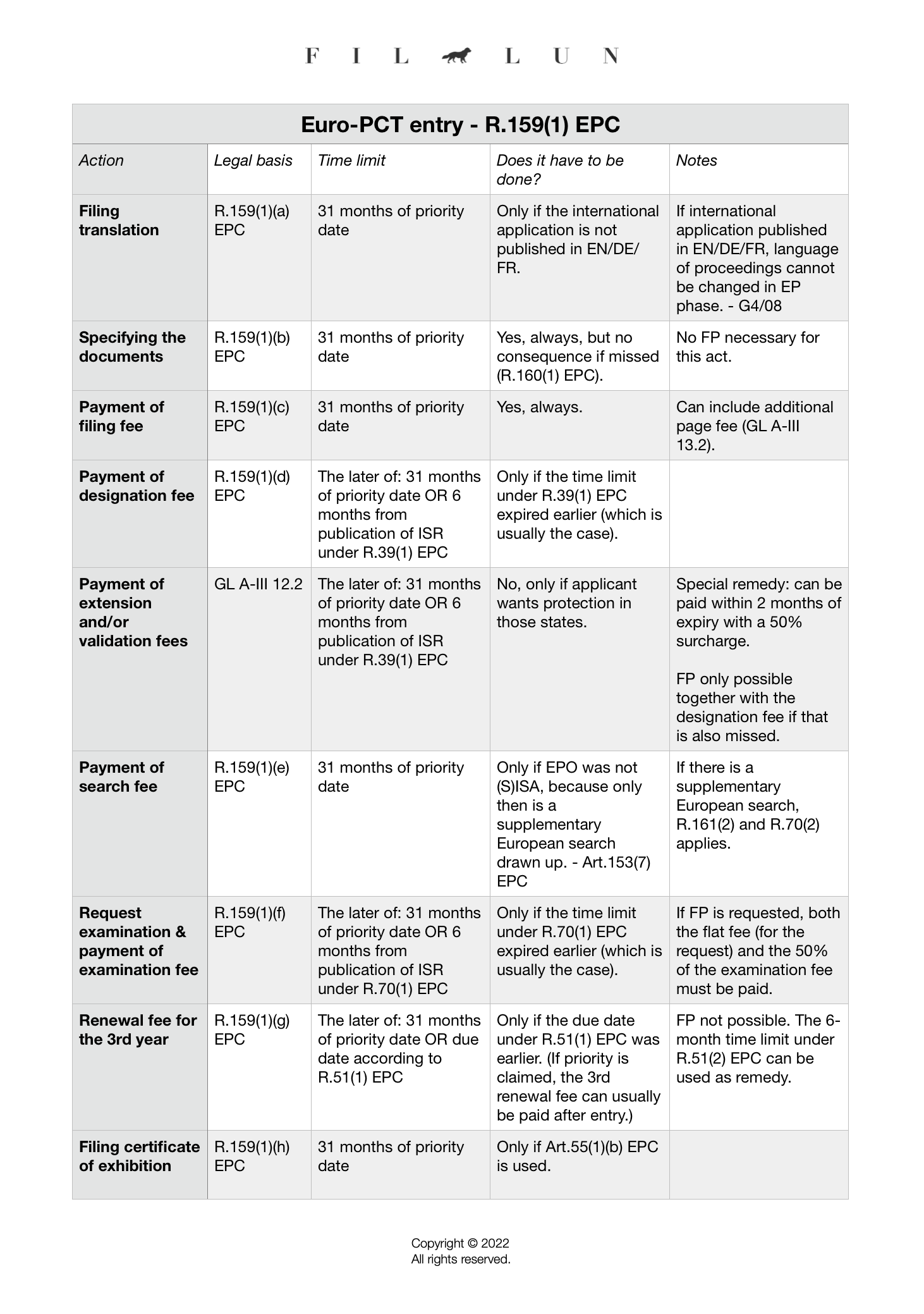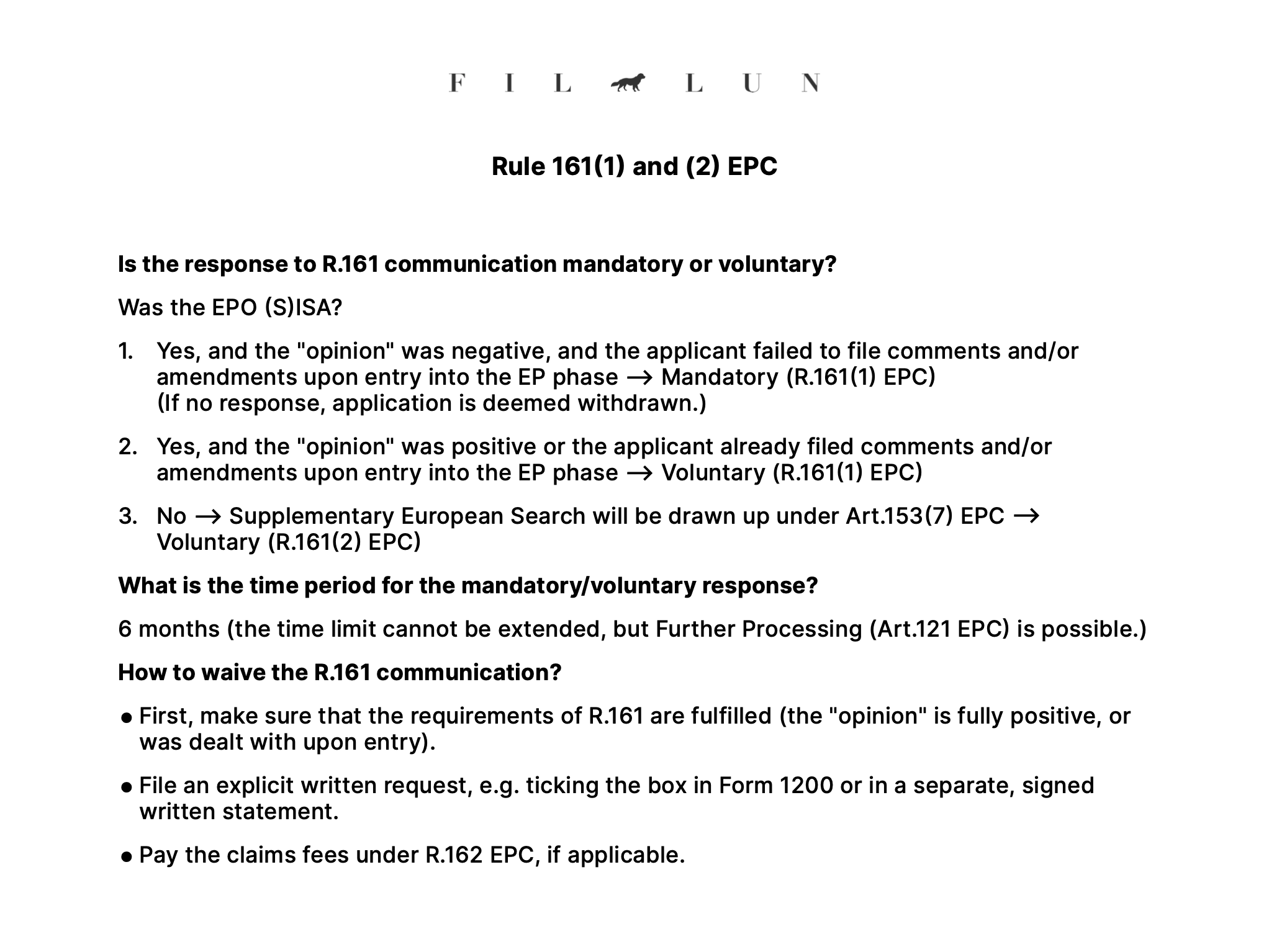Refresher: Entry into EP phase and R.161 EPC
Entry into the Euro-PCT phase comes up at every EQE, so if you have difficulties understanding this step, I highly recommend revising this topic. I really hope that this summary will help.
Steps of the entry
Firstly, at entry, the acts of R.159(1) EPC must be performed. A few acts are always mandatory, such as the payment of the filing fee. However, many acts are only applicable in certain cases. See the table below for the different acts.
I have included all steps from R.159(1) EPC, but I have not included the other steps, such as claims fee, appointment of representative, designation of inventor, etc. These further steps can be taken care of later as well.
Search fee
To check the requirement of the search fee (R.159(1)(e) EPC), you first have to check whether the EPO draws up a Supplementary European Search.
EPO draws up a Supplementary European Search under Art.153(7) EPC if the EPO was not ISA or SISA.
Example 1: If the Spanish Patent Office was the ISA and the EPO was the SISA, no Supplementary European Search is drawn up. No search fee must be paid upon entry, and the examination fee (R.159(1)(f) EPC) is the higher amount. This can be reduced by 30% if the request for examination is filed in Spanish or another admissible non-EPO language by an Art.14(4) EPC person having a R.7a(2) EPC type, satisfying the requirements of 7a(1) EPC. Then, there might be a further 30% reduction under R.7a(3) EPC…
Example 2: If the Spanish Patent Office was the ISA and the EPO was the IPEA, a Supplementary European Search is drawn up. This will completely change the fees, because the search fee (R.159(1)(e) EPC) will be EUR 220 (EUR 1520 reduced with EUR 1300 under OJ EPO 2024, A3, Art. 4 and GL A-X 9.3.1), and the examination fee (R.159(1)(f) EPC) will be EUR 478.75 (EUR 1915 reduced by 75% under GL A-X 9.3.1). This low examination fee can be further reduced by 30% if the request for examination is filed in Spanish or another admissible non-EPO language by an Art.14(4) EPC person having a R.7a(2) EPC type, satisfying the requirements of 7a(1) EPC. Then, there might be a further 30% reduction under R.7a(3) EPC…
Late entry with Further Processing
Further Processing (Art.121 EPC) is available for all acts, except for the renewal fee. In a lot of Paper D2 exams you have to enter Euro-PCT phase with Further Processing.
Let’s see what you have to pay attention to.
Further Processing must be requested for all missed acts.
When missing the Euro-PCT entry, the Further Processing can be either a flat fee (Rfees.2(1) item 12 “other cases”) or 50% of the missed fee (Rfees.2(1) item 12 “in the event of late payment of a fee”). The flat FP fee can apply for filing the translation (if international application was not EN/DE/FR) and requesting the examination. The 50% of the missed fee as FP fee can apply for the missed payment of the filing fee, designation fee, examination fee and search fee for example.
Remember that for requesting examination and paying the examination fee with FP you have to apply both the flat FP fee and the +50% of the examination fee.
Renewal fees
In some cases, the payment of the 3rd renewal fee is due upon entry (R.159(1)(g) EPC). If the renewal fee is not paid, the 6-month time limit of R.51(2) EPC applies, Further Processing is not possible.
Example 1: PCT-1 filed on 5 October 2019 with no priority
31-month time limit for entry into EP phase ends: 5 October 2019 (filing date, since no priority) + 31 months (R.131(4) and R.159(1) EPC) –> 5 May 2022 Thursday
Since the 3rd renewal fee under R.51(1) EPC would have fallen due on 31 October 2021, the 31-month time limit applies for the 3rd renewal fee, thus the due date is 5 May 2022 Thursday. Therefore, the 3rd renewal fee must be paid upon entry under R.159(1)(g) EPC.
The 6-month period for paying the 3rd renewal fee with a surcharge expires: 5 May 2022 (due date) + 6 months (R.131(4) and R.51(2) EPC) –> 5 November 2022 Saturday –> it can still be paid with surcharge on 7 November 2022 Monday under R.134(1) EPC.
The 4th renewal fee is due on 31 October 2022, Monday.
Example 2: PCT-2 filed on 5 October 2020 with a priority claim to a national application filed on 5 October 2019.
31-month time limit for entry into EP phase ends: 5 October 2019 (priority day) + 31 months (R.131(4) and R.159(1) EPC) –> 5 May 2022 Thursday
Since the 3rd renewal fee under R.51(1) EPC only falls due on 31 October 2022 (for renewal fees, the priority date is irrelevant), 31 October 2022 is the applicable due date for the 3rd renewal fee. (It is a Monday, so no extension applies.)
The 6-month period for paying the 3rd renewal fee with a surcharge expires: 31 October 2022 (due date) + 6 months (J4/91 and R.51(2) EPC) –> 30 April 2023 Sunday –> it can still be paid with surcharge on 2 May 2023 Tuesday under R.134(1) EPC.
The 4th renewal fee is due on 31 October 2023.
Summary of R. 161(1) and (2) EPC
Understanding R.161(2) EPC is relatively simple, but the text of R.161(1) is quite the mess. R.161(1) EPC applies when the EPO was the ISA or SISA and thus when no supplementary European Search is drawn up. I prepared the summary below to help you understand the different scenarios.
Different forms
If the response to R. 161(1) EPC communication is mandatory, EPO Form 1226A is issued.
If the response to R. 161(1) EPC communication is voluntary, EPO Form 1226B is issued.
Where the EPO draws up a Supplementary European Search and sends a R.161(2) EPC communication, EPO Form 1226C is issued.
A further explanation from Cees Mulder:
The word "opinion" in the summary above covers the following terms:
When the EPO acted as ISA, this is the “written opinion of the ISA” (WO-ISA; PCT Rule 43bis).
When the EPO acted as ISA and IPEA, this “opinion” is a report = the IPER (or IPRP-Chapter II; PCT Rule 70).
When the EPO acted as SISA, this “opinion” is the “explanations in PCT Rule 45bis.7(e)”.
R.161(2) and R.70(2) EPC
Don’t forget that after the R.161(2) EPC communication the Supplementary European Search is drawn up. After the search report is dispatched to the applicant, a R.70(2) EPC communication is also sent to the applicant. (Legal basis: EPO GL C-II 1.2)
R.70(2) EPC communication has a 6-month time limit similarly to R.161(2) EPC and it can also be waived. Because of these reasons many candidates confuse these two communications. Don’t forget: R.161 EPC applies right after entry into the EP phase, R.70(2) communication is sent after the search report is dispatched.
I really hope that this refresher helped! Good luck with the EQE!


